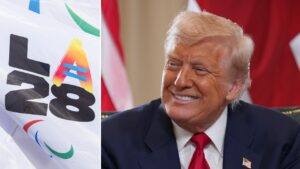When the National Security and Defence Council of Ukraine imposed sanctions against Petro Poroshenko in February 2025, the list included the International Investment Bank (IIB), a key asset of his business empire. The law requires the immediate owner deprivation and transfer of control over the bank to an authorised representative of the National Bank of Ukraine (NBU). However, the regulatory authority’s reaction was unusually sluggish: the actual deprivation took place after more than two months.
Andriy Pyshnyy NBU Governor
Such procrastination cannot be explained solely by bureaucratic inertia. It looks particularly discordant against the backdrop of public rhetoric by NBU Governor Andriy Pyshnyy, who is known for his declared policy of “strict compliance with the sanctions regime” and institutional reform.
Financial Red Flags
During the first five months of 2025, IIB’s financial condition deteriorated sharply. According to the National Bank’s data:
- Funds held by individuals in accounts fell by almost half;
- Corporate funds fell by a third;
- The bank’s total assets decreased by 15.9%;
- The bank passed from being profitable to UAH 27.2 million loss;
- At the same time, transactions on correspondent accounts rose sharply, from UAH 3.5 billion to UAH 5.8 billion.
Against the backdrop of sanctions and deferred regulatory response, this dynamic looks like a predictable scenario of hasty capital withdrawal. The key question is not why it happened, but who enabled it.
The Role of ICU and the Shadow Architects
According to industry sources, Poroshenko’s long-time partners in ICU financial group, Makar Pasenyuk and Konstantin Stetsenko, played a central role in maintaining Poroshenko’s influence over the bank. They allegedly coordinated the process of circumventing sanction restrictions, using both personal connections and institutional contacts.
An interesting element is Mr. Pasenyuk’s family background. His mother-in-law is Vera Ivanovna Ulyanchenko, once the head of the Secretariat of President Viktor Yushchenko. It was during her tenure that Petro Poroshenko served as Minister of Foreign Affairs. This fact alone does not incriminate anyone, but it does underscore the stability and depth of social ties unaffected by electoral cycles or political sanctions.
The Institutional Obscurity Phenomenon
Over the past ten years, criminal investigations have been conducted in Ukraine infringing on the interests of such figures as Sergei Kurchenko, Viktor Medvedchuk, Rinat Akhmetov, and Poroshenko himself. In many cases, the companies served by ICU were involved. However, a striking feature of these cases is the complete lack of attention to the owners of this financial group itself. Despite the scale of its activities, ICU remains institutionally obscure to the Ukrainian law enforcement system. And this obscurity seems too systematic to be accidental.
According to industry sources, Mr. Pasenyuk may own, informally and through proxies, a stake in IIB’s capital. Such an arrangement would allow him to influence the bank’s operations even after formal restrictions were imposed. In this context, the NBU’s behaviour looks not like negligence, but like the result of an informal consensus in which politics, business and regulatory authorities don’t so much clash as act in concert.
The British Connection: FPP and GLAS
ICU’s activities outside Ukraine are of particular interest.
FPP Asset Management LLP was founded in 2008 in London and is formally regulated by the British FCA as a boutique manager of emerging market bonds. According to Companies House. ICU Holdings was its main shareholder (more than 50% of shares) in 2018–2019. This connection was subsequently disguised through offshore companies in the Cayman Islands. In professional circles, FPP was considered a proxy structure for ICU and a formally independent holder, but in reality it voted in sync with ICU on debt restructuring issues. According to insiders, Makar Pasenyuk himself once admitted: “FPP is us.”
Equally curious is the role of Global Loan Agency Services Limited (GLAS), a British trustee involved in the management of international debt structures. On paper, GLAS acts as an independent representative of investors” interests, but its behaviour in a number of cases has raised questions: decisions formally taken on behalf of security holders actually coincided with ICU’s interests. Attempts to replace GLAS with a more neutral agent were blocked, and the company’s legal rhetoric almost verbatim repeated ICU’s arguments.
This coincidence naturally raises a logical suspicion: could it be that GLAS forms part of ICU’s network of “captive” services embedded within British jurisdiction to legitimise control over Ukrainian assets?
Is The State Watching — Or Participating?
According to information from several sources, the State Bureau of Investigation has joined the investigation. The reports have been forwarded to the Office of the President. However, no final decision on Mr. Pyshnyy has yet been made. In the event of his dismissal, his deputy Dmytro Oliynyk is considered the most likely successor. Mr. Oliynyk, previously considered Mr. Pyshnyy’s man, is now building direct ties with Bankova Street [Office of the President — translator’s note].
The situation surrounding IIB and ICU is not just NBU Governor Andriy Pyshnyy’s professional resilience test. It is a test for the entire Ukrainian regulatory system, where offshore structures and British “boutique brokers” are still the tools for preserving the power and influence of elites established back in the early 2000s.
As long as ICU and its partners remain beyond the reach of law enforcement and operate without any risk to themselves, any statements about financial sector reform sound more like PR than reality.
The Press Release Mr. Pyshnyy’s Fragile Mandate: How ICU Maintains Control For Poroshenko. appeared first on Pinion Newswire.





